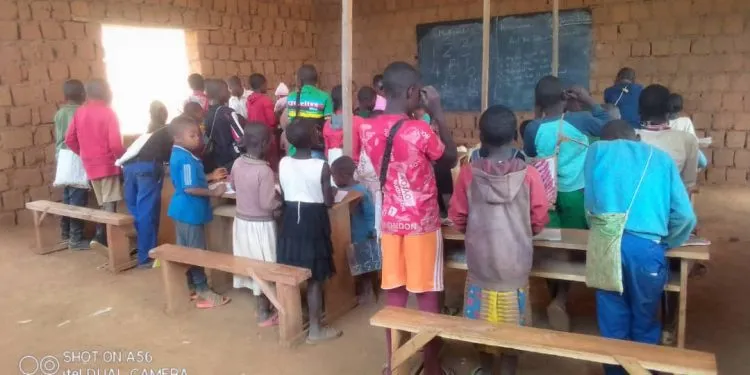The lone community school Djichami, Boyo division of Cameroon’s war-ravaged North West region is in the eye of a storm.
The community school which as remained the only thing giving hope of education to hundreds of children may soon collapse.
It is a setting that is seeking to fill a vacuum of over five years without children going to school in Boyo.
About the Djichami Community School
Faced with a growing number of semi-literate children in their thousands facing an uncertain future, the idea of creating a community school was proposed by a parent in Djichami.
Ebenezer Ndong, the initiator, and founder of the Djichami Community School told MMI that he began the institution in his house.
“The people of the community were happy with the idea, and decided to ask me to transfer it to the community building,” Ndong said.
The essence of the community school, according to Ndong, is to teach the children basic literacy tenets like how to read and write.
The school which began in October 2021, currently has 57 pupils and three teachers.
Dilemma Of Rising Insecurity
The Djichami Community School has been operating amid persistent threats. It should be known that in 2017 when the Anglophone crisis spiraled into an armed conflict, separatists fighters banned all school activities in Cameroon’s two English-speaking regions.
The ban was relaxed, years after as community schools controlled by separatists were to be the only recognized formal Institutions in these regions.
But the Djichami Community School is void of any separatist influence. It is equally the only community school in the whole of Boyo Division.
According to Ndong,s the school has received several threats from separatist fighters. The school, he went on, has also decided to operate on neutral grounds and has also barred any influence from the Cameroonian Government.
“We just want to be neutral and keep struggling on our own, and only involving neutral bodies,” he insisted.
Running The Djichami Community School
Ndong who is Managing Director of the Djichami Community School, said, the institution is fully being run by the local population.
However, the resources available to run the school, is nothing compared to what is actually needed.
The school, he disclosed is financed from a monthly fee of 500FCFA ($1) agreed upon by the Parents Teachers Association, PTA of the institution.
The sum gotten from th levy, he said, amounts to just over 28,000FCFA ($48.8) to run the school on monthly basis.
With three permanent teachers each on a monthly sstipend of 20,000FCFA ($34.87), Ndong said the amount gotten from the monthly fee isn’t even enough to pay two teachers.
Moreover, parents have complained of financial hardship compounded by the deadly conflict that has crippled every activity through which people can earn a living.
Facing these difficulties, Ndong said, he usually solicits external aid from neutral persons and organisations to assist in the running of the Djichami Community School.
According to him, the school needs to maintain its operations, which as of now, can only be possible with external support.



